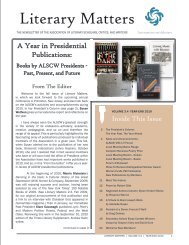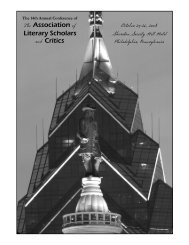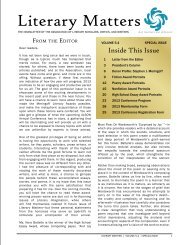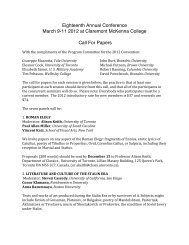Literary Matters 5.3 - Association of Literary Scholars, Critics, and ...
Literary Matters 5.3 - Association of Literary Scholars, Critics, and ...
Literary Matters 5.3 - Association of Literary Scholars, Critics, and ...
You also want an ePaper? Increase the reach of your titles
YUMPU automatically turns print PDFs into web optimized ePapers that Google loves.
Despite Othello’s deep-seated fear <strong>of</strong> “circumscription,”which arises from his confined, authenticself, he has surrounded himself withthe pageantry, the “pomp <strong>and</strong> circumstance<strong>of</strong> glorious war.” Without these idealized images<strong>of</strong> chaos as aids, he could not sustainthe image <strong>of</strong> his “perfect soul,” which walls<strong>of</strong>f the true chaos at the core <strong>of</strong> his being, theunbridled ferocity <strong>of</strong> the “circumcised dog” hethought he had been converted from when heembraced Christianity. We catch a glimpse <strong>of</strong>the cold, protective prison in which he has encasedhimself in his image <strong>of</strong> an ideal, artificialworld, “[o]f one entire <strong>and</strong> perfect chrysolite,”which he now realizes cannot comparein value to Desdemona’s love (5.2.150).Earlier we said that Othello’s last speech arisesfrom his need to free himself so that hemay die. More accurately, it is so that he mayavenge Desdemona’s death. He wants to killhis hated self. Let us look more closely at thespeech now to see how the lines themselvespoint to where he first frees one arm, <strong>and</strong> nextthe other, until, with the sword or dagger heseizes from one <strong>of</strong> the transfixed guards, hecan plunge the blade into his own breast: 13S<strong>of</strong>t you; a word or two before you go.I have done the state some service, <strong>and</strong>they know ‘t.No more <strong>of</strong> that. I pray you, in your letters,When you shall these unlucky deeds relate,Speak <strong>of</strong> me as I am; nothing extenuate,Nor set down aught in malice. Then mustyou speakOf one that lov’d not wisely but too well;Of one not easily jealous, but, being wrought,*Perplex’d in the extreme; <strong>of</strong> one whosh<strong>and</strong>,Like the base Indian, threw a pearl away*Richer than all his tribe; <strong>of</strong> one whosesubdu’d eyes,Albeit unused to the melting mood,Drops tears as fast as the Arabian treesTheir medicinable gum. Set you down this;And say besides, that in Aleppo once,Where a malignant <strong>and</strong> a turban’d Turk13 Lines addressing the two points in question have been markedwith marginal asterisks by the author.Beat a Venetian <strong>and</strong> traduc’d the state,I took by th’ throat the circumcised dog,And smote him, thus. Stabs himself.(5.2.347–65)There are, <strong>of</strong> course, subtleties in the construction<strong>of</strong> this magnificent utterance thatpermit individual actors to vary their interpretationsin significant ways as they make it theirown. But I think few would dispute that thegesture <strong>of</strong> casting aside, a pearl arises naturallyat the point the words refer to the act,just as the raising <strong>of</strong> his other h<strong>and</strong> to coverhis face seems appropriate for the lines thatfollow his reference to his “subdu’d eyes.”Then, following the natural break that occurswith “Set you down this” (5.2.360), thereare numerous possibilities, but the one thatsuggests itself to me as the most dramaticallycompelling is for Othello to take “by thethroat” one <strong>of</strong> the guards with his left h<strong>and</strong>,seize that guard’s own weapon with his righth<strong>and</strong>, <strong>and</strong>—holding this posture between“smote him” <strong>and</strong> “thus” as long as is dramaticallyfeasible—on that final word, simultaneouslyrelease his grip on the guard <strong>and</strong> sinkthe blade into his own breast instead. Thisact, after all, has been his motive for speakingfrom the moment at which his “S<strong>of</strong>t you”halted his forced exit; this has been the “verysea-mark <strong>of</strong> his utmost sail” (5.2.27), thoughhe had not realized it until now, <strong>and</strong> this iswhat the “magic” <strong>of</strong> his eloquence permitshim to achieve.John Freund is Emeritus Pr<strong>of</strong>essor <strong>of</strong> English at IndianaUniversity <strong>of</strong> Pennsylvania. His scholarly interests are humancommunication <strong>and</strong> Shakespeare. Among his publicationsare “Entropy <strong>and</strong> Composition,” in College English,41, no. 5 (January 1980), 493–516, <strong>and</strong> BrokenSymmetries: A Study <strong>of</strong> Agency in Shakespeare's Plays(Lang, 1991). His instructional TV program, The Nature<strong>of</strong> Perception, received the Ohio State Award for best inthe category <strong>of</strong> the natural <strong>and</strong> physical sciences in 1964.24 LITERARY MATTERS | VOLUME <strong>5.3</strong> | FaLL/WINTER 2012







